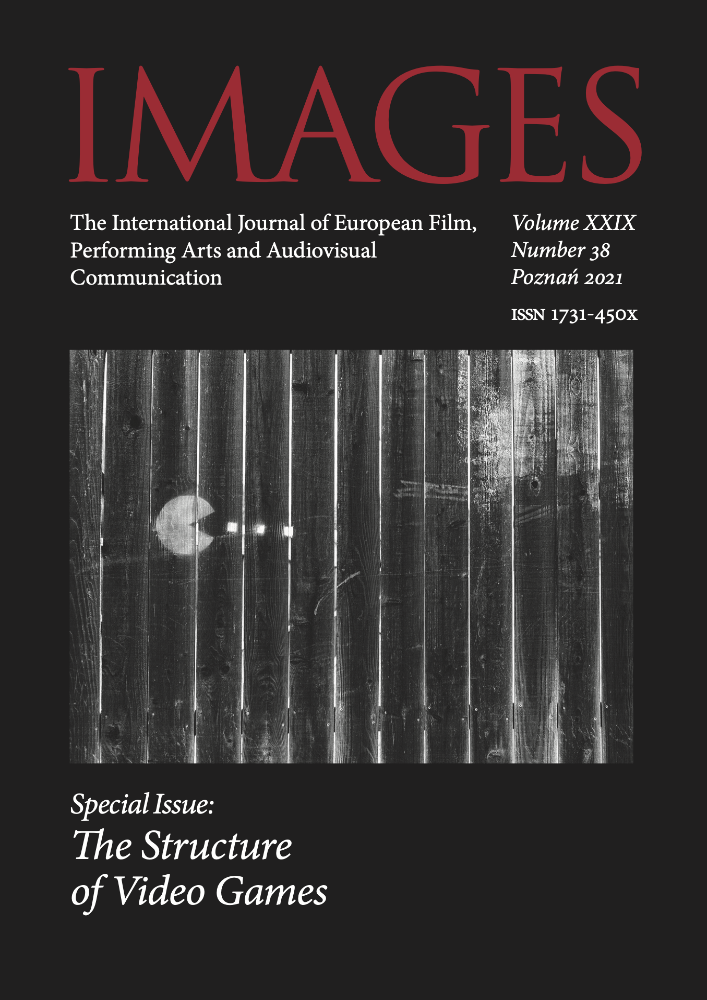Abstract
This paper explores the interdependency between digital matter and the representational or mimetic layer of the digital game object. The main aim is to foreground the mechanisms by which the representational
elements of the game world emerge from the materiality of the process of play. These mechanisms are examined from the perspective of the ontology of the game object. The issue of digital materiality will be linked with the aesthetical explorations of Tadeusz Kantor, who emphasised the relation between the materiality of the theatre and its fictional elements. As the main example of this analysis, I will focus on Undertale (Toby Fox, 2015) as an example of a game that plays with the boundaries between the fictional world being presented and the elements of digital materiality that are usually hidden from the player’s sight.
Funding
The article was created within the research project PRELUDIUM 14 financed by National Science Centre, Poland (Jagiellonian University 2017/27/N/ HS2/00672, “Gra jako obiekt oporny. Relacja gracza z grą wideo w perspektywie posthumanistycznej” [Game as a resistant object. Relationship between the player and the video game in posthuman perspective]”).
References
Aarseth E., Doors and perception: fiction vs. simulation in games, “Intermédialités / Intermediality” 2007, no. 9, p. 35–44, <https://doi.org/10.7202/1005528ar>, accessed: 21.01.2021
Apperley T., Gaming Rhythms: Play and counterplay from the situated to the global, Amsterdam 2010
B.d., Interview with Yuk Hui in Popphilosophy, 24 February 2017, <http://philochina.org/?p=231>, accessed: 21.01.2021
Calleja G., In-Game: from immersion to incorporation, Cambridge 2011
Cyberpunk 2077 (CD Projekt, 2020)
Firewatch (Campo Santo, 2016)
Fortnite: Battle Royale (Epic Games, 2017)
Galloway A.R., Gaming: Essays on algorithmic culture, Minneapolis 2006
Hui Y., Towards a relational materialism, “Digital Culture & Society” 2015, vol. 1, no. 1
Hui Y., What is a digital object?, “Metaphilosophy” 2012, vol. 4, no. 43
Janik J., Ghosts of the present past: Spectrality in the video game object, “Journal of the Philosophy of Games” 2019, vol. 1, no. 2, <https://journals.uio.no/JPG/article/view/2943>, accessed: 21.01.2021
Janik J., Glitched perception: beyond the transparency and visibility of the video game object, “TransMissions: Journal of film and media studies” 2017, vol. 2, no. 2, <http://transmissions.edu.pl/glitched-perception-beyond-the-transparency-and-visibility-of-the-video-game-object/>, accessed: 21.01.2021
Juul J., The game, the player, the world: Looking for a heart of gameness, [in:] Level Up: Digital Games Research Conference Proceedings, ed. M. Copier, J. Raessens, Utrecht 2003, pp. 30–45
Kantor T., Teatr śmierci: Teksty z lat 1975–1984, Wrocław 2004
Kantor T., The Room: Maybe a New Phase (1980), [in:] M. Kobialka, Further On, Nothing: Tadeusz Kantor’s theatre, Minneapolis 2009
Karhulahti V.-M., Defining the videogame, “Game Studies. the international journal of computer game research” 2015, vol. 2, no. 15, <http://gamestudies.org/1502/articles/karhulahti>, accessed: 21.01.2021
Kirschenbaum M.G., Mechanisms: New media and the forensic imagination, Cambridge, MA, – London 2012
Klevjer R., Enter the Avatar. The phenomenology of prosthetic telepresence in computer games, [in:] The Philosophy of Computer Games, ed. J.R. Sageng, F. Hallvard, L.M. Tarjei, Dordrecht 2012
Kłossowicz J., Tadeusz Kantor – teatr, Warszawa 1991
Kubiński P., Gry wideo: Zarys poetyki, Kraków 2016
Leino O.T., Death loop as a feature, “Game Studies: the international journal of computer game research” 2012, vol. 12, no. 2, <http://gamestudies.org/1202/articles/death_loop_as_a_feature>, accessed: 21.01.2021
Maj K.M., Światotwórstwo w fantastyce. Od przedstawienia do zamieszkiwania, Kraków 2019
Majkowski T., Języki gropowieści: studia o różnojęzyczności gier cyfrowych, Kraków 2019
Malaby T., Beyond play: A new approach to games, “Games & Culture” 2007, vol. 1, no. 2
Pleśniarowicz K., Teatr Śmierci Tadeusza Kantora, Chotomów 1990
Rez (United Game Artists, 2001)
Robson J., Meskin A., Video games as self‐involving interactive fictions, “The Journal of Aesthetics and Art Criticism” 2016, vol. 74, pp. 165–177, <https://doi.org/10.1111/jaac.12269>, accessed: 21.01.2021
Ryan M-L., Avatars of Story, Minneapolis 2006
Salen K., Zimmerman E., Rules of Play. Game design fundamentals, Cambridge 2004
Święcicki K., Historia w teatrze Tadeusza Kantora, Poznań 2007
Tetris Effect (Monstars Inc. & Resonair, 2018)
Van de Mosselaer N., Fictionally flipping tetrominoes? Defining the fictionality of a videogame player’s actions, “Journal of the Philosophy of Games” 2018, vol. 1, no. 1, <https://doi.org/10.5617/jpg.6035>
License
Copyright (c) 2021 Justyna Janik

This work is licensed under a Creative Commons Attribution 4.0 International License.

